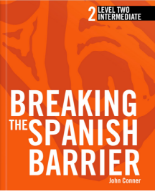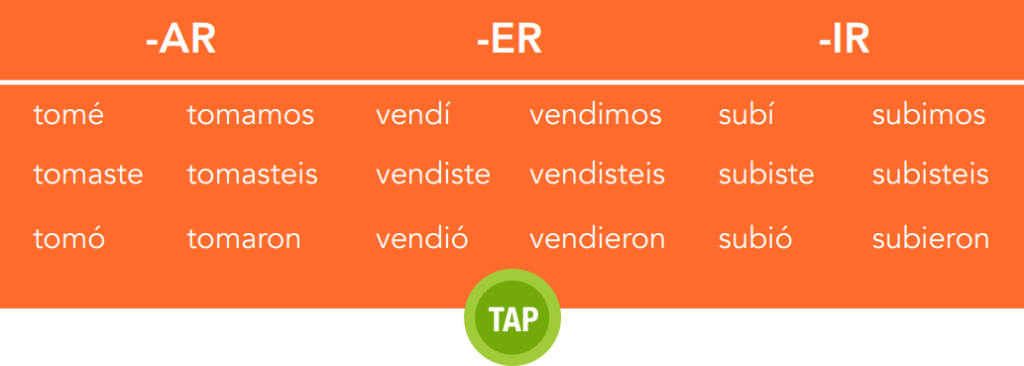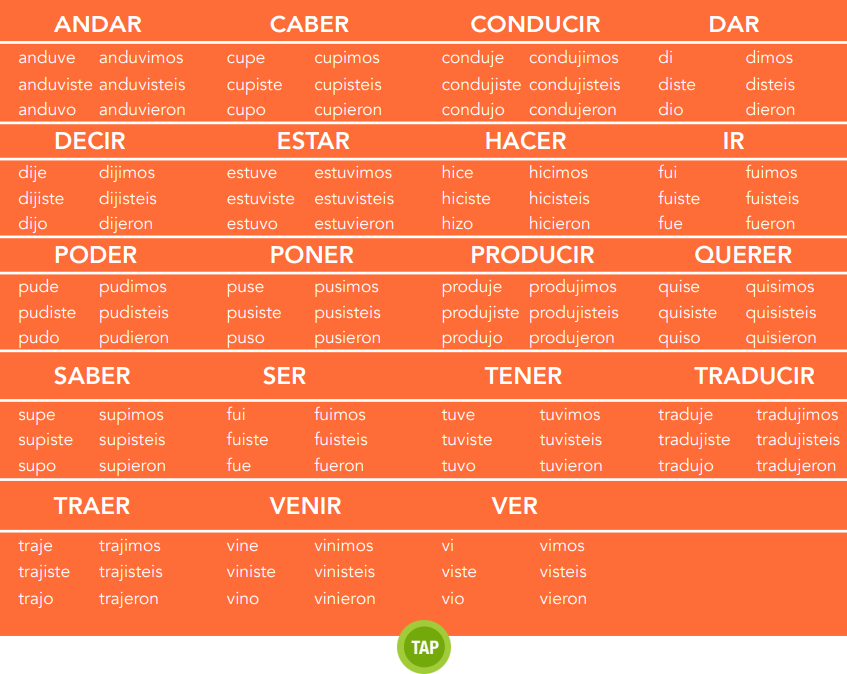LECCIÓN 2 / Intermediate

VERBS IN THE PRETERITE TENSE
The preterite is a past tense. It describes actions or events that occurred prior to the present.
The preterite is used to describe completed actions, ones with a clear beginning or ending point. Therefore, whenever you tell how long something was being done, use the preterite.

You bought many tomatoes in the store.
The bilingual waiter served shellfish to Penélope Cruz with a spoon.
I turned off the lights upon leaving the bar.
But Dad, we only drove the car for twenty minutes!
Alabama won the football championship in 2016.

How do we form the preterite?
1. Regular verbs
Here are the conjugations for all regular verbs:
Note: There are accent marks only on the 1 st person and 3rd person singular forms.
1. Compare the tú and vosotros forms. Just add an
“-is” to the tú form and you have vosotros!
2. Did you notice that the preterite of –ER and –IR
verbs are identical?

impresionantes.
Diego Velázquez painted many impressive
pictures.
astrología.
Yesterday I didn’t understand anything in my
astrology class.
We climbed up to the tower of the Alcázar of
Segovia to see the fantastic view of Castile.
I met Mariano Rajoy near his office in Madrid.
Last night we spent only an hour in the library.
You all arrived late to the movie.

Jaime Camil and Albita returned to the stage
after the applause.
Scrooge counted all his money several times.
b. -IR “boot” verbs
These verbs have a special pattern. It’s in the 3rd person singular and plural only that changes occur:
o ![]() u and e
u and e ![]() i.
i.
Note: It is only in the “sole” of the boot where changes occur! You might consider the look here to be like that of a slipper instead.

Emilio served coffee from his new coffee maker to Gloria.
My jealous siblings lied to me last night.
The candidate asked for patience when she spoke with the press.
The girl slept a few hours in the little house of her grandpa.
*Do you remember that the ending “-ita/-ito” can be used with nouns to signal a diminutive size or affection on the part of the speaker?


3. Spelling-changers

I turned off the lights when I heard a noise outside.
I began to speak with my boyfriend after watching NCIS: Los Angeles.
The strong winds and the rain destroyed the houses.
The lazy boy didn’t read the article.
I played the guitar for half an hour for my girlfriend.


4. Super-irregulars
Certain verbs are irregular in the preterite tense. You will notice that there are no accent marks on any of these forms.
You need to memorize these forms:

Here are some of these irregular verbs in action:
comenzaron a cantar.
I refused (didn’t want) to leave when Chino
and Nacho began to sing.
noche.
Carlos Vives was in Medellín only for one
night.
Goldilocks didn’t fit into the chairs of the
bears.
Who put my wallet in the toaster?
Juan Luis Guerra.
My cousins brought me the new Juan Luis
Guerra album.
aficionados.
We said “goodbye” to all of our fans.
español”, se quejó la profesora.
“You didn’t translate the poem from English to
Spanish,” complained the teacher.
Cowboys para ver el partido.
We went to the new stadium of the Dallas
Cowboys in order to see the game.
Normally my brother helps in the kitchen, but
yesterday he did nothing.







